






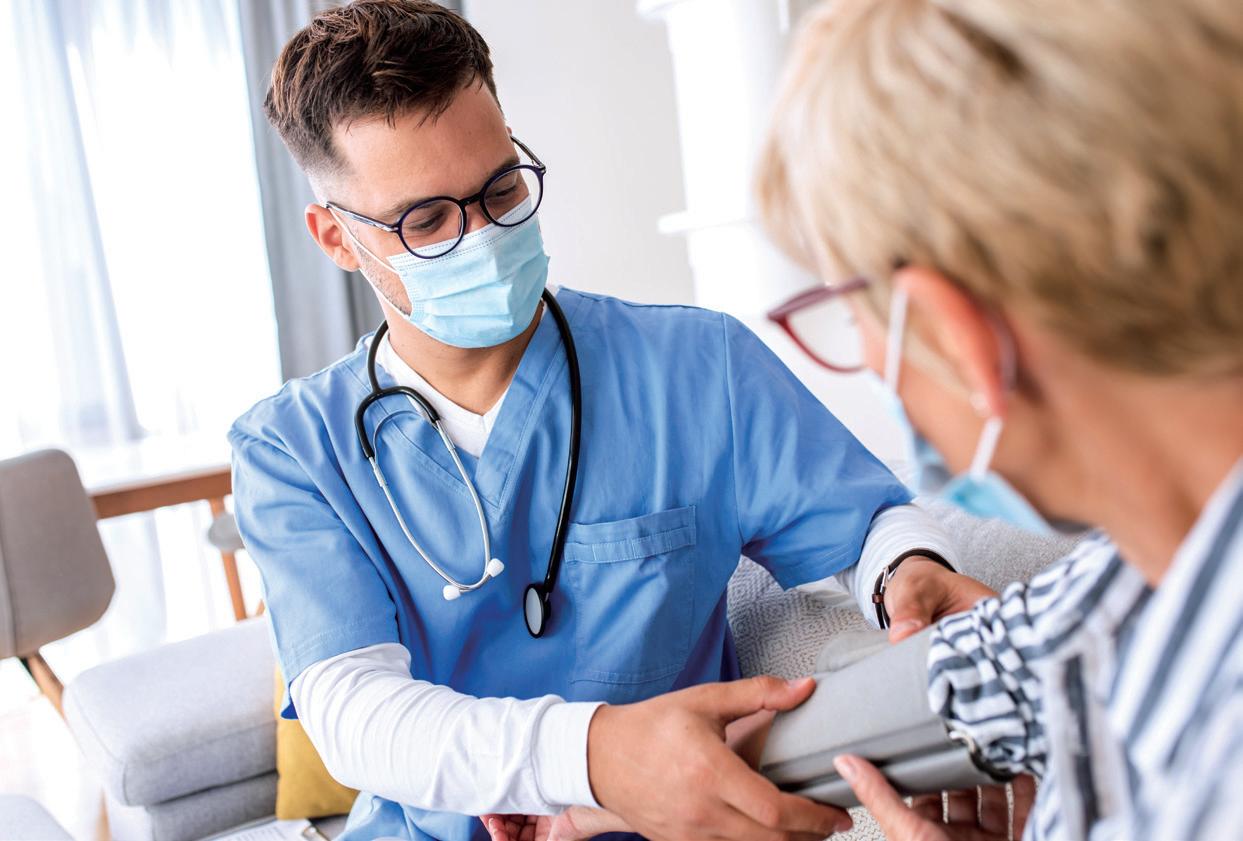
1 What is the nurse in the picture doing?
2 What kind of person do you think makes a good nurse?
Read the list of words. Pay attention to these words throughout the unit.
Words for forms
• full name
• first name
• last name
• date of birth
• fill it out
• cell phone number
• contact person
• email address
Paperwork
• travel insurance
• health insurance
Departments/Places
• cardiology
• orthopedics
• pediatrics
• gastroenterology
• restroom
Medical Concerns
• blood pressure
• infection
• allergies
• blood sugar (level)
• flu
• temperature
Equipment
• sample cup
• glucometer
Symptoms
• shortness of breath
• chest pain
• headache
• cough Medicines
• supplement
• medication
Body Parts/Bodily
Fluids
• finger
• urine (pee)
Other
• pinprick
• 37.5 (degrees) Celsius
• mood
• elevated
• reading glasses
• serious
• problem
Read the list of expressions. Then match them to the appropriate statements or phrases by writing the correct number on the line. Use the dialogs on p. 8 and p. 10. to help you.
1. I’m not feeling well.
2. Can you please fill out this form for me?
3. Could I have your full name, please?
4. Can you spell your last name for me, please?
5. Can you tell me your date of birth?
6. Do you have a health insurance card?
7. Do you have any allergies?
8. What seems to be the problem today?
9. Can you please give me a sample of urine in this cup?
10. Can you describe some of your symptoms?
a. It’s March 15th, 1982.
c. I’m allergic to penicillin.
e. I have a headache and a cough.
b. I have travel insurance. Is that OK?
d. Sure. It’s S - T - E - P - HE - N - S - O - N.
f. I’ve been very tired, and I seem very thirsty and pee a lot.
g. My first name is Peter, and my last name is Stephenson.
h. I’m sorry, but I forgot my reading glasses.
Practice the conversation with a partner. Use the words or phrases in the box or your own ideas.
A Do you have any allergies?
B I’m allergic to penicillin.
nuts
seafood
aspirin
eggs • a few different antibiotics
Study the sample hospital form below.
Last
How would you prefer to be contacted?
Procedure/Reason for Admission
Emergency Contact Information
Last Name First Name Phone Number Relationship to you
Have you been admitted to this hospital before? Yes No
Have you been admitted to any hospital within the last 7 days? Yes No Reason
Previous Surgery/ Procedures
Do you take supplements? (e.g. vitamins, fish oil)
List all medications you are taking
List all allergies
Over to You
1 What does your hospital admission form look like?
2 What is the most useful section of the form to you?
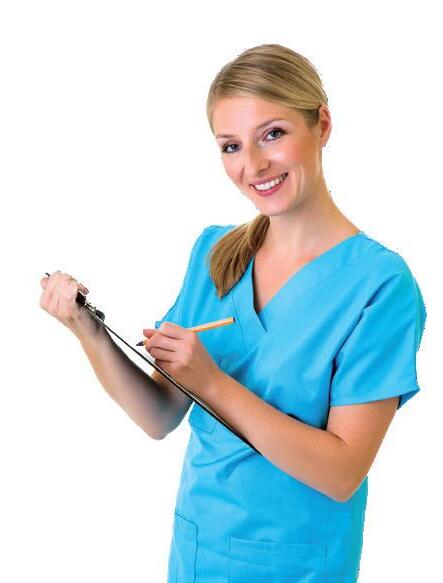
Read. Write the correct words in the blanks (1- 8). Watch and check. (Not all words will be used.)
headache reading glasses allergies flu email address full name phone number date of birth travel insurance health insurance card
Patient: Good afternoon. I think I have the 1
Nurse: I understand. Have you visited this hospital before?
Patient: No. It is my first time.
Nurse: Can you please fill out this form for me?
Patient: I am sorry, but I forgot my 2
Nurse: No problem. Do you want me to fill it out for you?
Patient: Yes. Thank you.
Nurse: Could I have your 3 , please?
Patient: My first name is Peter and my last name is Stephenson.
Nurse: Can you spell your last name for me?
Patient: Sure. It is S-T-E-P-H-E-N-S-O-N.

Nurse: Thank you, Mr. Stephenson. Can you tell me your 4 ?
Patient: March 15th, 1982.
Nurse: Thank you.
Patient: I am here from the United States for work. I have 5 . Is that OK?
Nurse: That is fine. Can you show me your insurance information?
Patient: Yes. Here you go.
Nurse: Thank you. Do you have an address in Japan?
Patient: I’m staying at the Palace Hotel in Shibuya. This is the address.
Nurse: OK. Do you have a contact person here in Japan?
Patient: Not really. I can give you my wife’s 6 in the U.S.
Nurse: That is fine. Do you have a phone number in Japan?
Patient: My cell phone number is 617-555-0715.
Nurse: Do you have any 7 ?
Patient: I’m allergic to penicillin.
Nurse: Alright, thank you.
Patient: I have a 8 and a cough.
Nurse: OK. Could I please take your temperature?
Patient: Sure.
Nurse: OK. It’s 37.5 degrees. Please take a seat over there. We’ll call you in a few minutes.
Write the correct key expressions in the script above. (Not all expressions will be used.)
• I am not feeling well.
• What seems to be the problem today?
• Do you have a health insurance card?
• Do you have any allergies?
• Can you spell your last name for me, please?
Read the questions and choose the best answers.
1. Why did the patient go to the hospital?
a. He wanted to get health insurance.
b. He thought he had the flu.
c. He wanted to work there.
d. He got sick from eating something.
2. Why was the patient in Japan?
a. Because he was visiting his girlfriend
b. Because he had to work
c. Because he wanted advanced medical treatment
d. Because he was looking for family members
3. Which information was not asked from the patient?
a. His health insurance card
b. His address and telephone number
c. His health condition
d. His family’s details
Ask and answer the questions with a partner.
Many American patients are used to hearing their temperature in Fahrenheit.
37.5°C is around 99.5°F
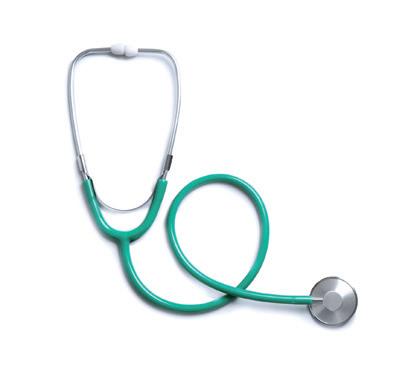
1. It is Mr. Stephenson’s first time to get treatment in your hospital. Ask him to fill out a form.
2. Ask for Mr. Stephenson’s name and birthdate.
3. How would you ask Mr. Stephenson if he has health insurance?
4. Ask Mr. Stephenson if he has any allergies.
5. Ask Mr. Stephenson about the problems with his health.
Complete the sentences with words from the video above.
1. Susan has many food including peanuts, shellfish, and strawberries.
2. Janice included her , but not her phone number on the form.
3. We need the email address and phone number for your in case of an emergency.
4. If you catch a bad cold or the flu, you might or sneeze a lot.
5. If you are visiting another country, you should get in case you get sick.
6. Your is over 40 degrees. We need to monitor you in case it rises further.
Read. Write the correct words in the blanks (1-10). Watch and check. (Not all words will be used.)
urine blood sugar infection glucometer temperature symptoms medications mood pinprick chest pain finger restroom
Nurse: Hi, Mr. Smith. How are you today?
Patient: I have not been feeling well lately.
Nurse:
Patient: I’ve been very tired, and I seem very thirsty and pee a lot, and my 1 smells different.
Nurse: I’ll check your 2 level by pricking your finger with a needle and checking your blood with the glucometer. Please give me your finger.
Patient: Will it hurt?

Nurse: It’s a 3 , like when you stick yourself with a needle or pin.
Patient: OK, that’s not bad.
Nurse: Have you been taking any 4 or supplements recently?
Patient: Yes, I started taking a new supplement a few weeks ago.
Nurse: Can you tell me what it’s called and what it’s for?
Patient: It’s called St. John’s wort, and it’s supposed to help with 5
Nurse: OK, thank you for letting me know. It’s important to inform your doctor of any supplements or medications you’re taking. I’m going to give you some medication to help with your 6 . Do you have any allergies to medications that I should be aware of?
Patient: No, I don’t have any allergies.
Nurse: Have you been experiencing any shortness of breath or 7 ?
Patient: No, not really.
Nurse: OK, good to know. Let me check your 8 and blood pressure as well.
Patient: OK.
Nurse: Your temperature is a bit elevated, which could indicate an 9 . I’ll let the doctor know.
Patient: Oh no, I hope it’s nothing serious.
Nurse: We’ll make sure to run some more tests. Is there anything else you’re concerned about or would like to ask me?
Patient: No.
Nurse:
Patient: OK.
Nurse: The 10 is down the hall on the left. Come back here after.
Write the correct key expressions in the script above. (Not all expressions will be used.)
• Can you tell me your date of birth?
• Do you have any allergies?
• Do you have a health insurance card?
• Can you please give me a sample of urine
• Can you describe some of your symptoms? in this cup?
Read the questions and choose the best answers.
1. Which was not among the patient’s symptoms?
a. Different urine smell
c. Peeing a lot
2. What will the nurse check for?
a. Blood pressure
c. Blood in the urine
3. Why was the patient asked to go to the restroom?
a. Because he needs to give a urine sample
c. Because he was really sick
Ask and answer the questions with a partner.
b. Feeling tired
d. Not wanting to eat anything
b. Blood sugar level
d. Blood on the finger
b. Because he needs to pee
d. Because he smells different
1. As a patient, how do you say that you’re not feeling well?
2. How do you ask Mr. Smith to talk about his symptoms?
3. You want to check Mr. Smith’s blood sugar. Ask for his finger.
4. Ask Mr. Smith if he has been taking medications or supplements.
5. How do you ask Mr. Smith for a urine sample?
Read and match the categories with the correct words.
1. Medical equipment
2. Medications
3. Dressings
4. Medical departments
• • a. gauze bandages, medical tape, ointments
• • b. needles, syringes, stethoscope, glucometer
• • c. orthopedics, pediatrics, gastroenterology, cardiology
• • d. pain relievers, antihistamines, antibiotics
Label the pictures using words from above.
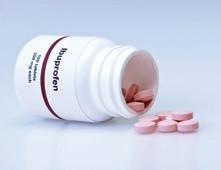
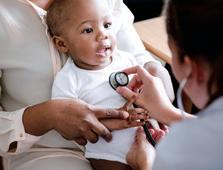
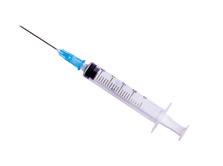
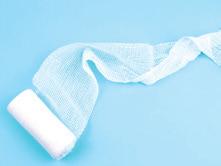
A Write the given words or phrases in the correct categories.
allergy antibiotic antihistamine date of birth cough flu stethoscope first name glucometer headache sample cup syringe contact person pain reliever email address penicillin
Personal Information
Medical Equipment
Medical Conditions & Symptoms Medications & Supplements
B Complete the sentences with the given words. Some words will NOT be used.
1. If your is , this could be a sign of an . If it is higher than 40 degrees , it could be serious.
infection temperature orthopedics Celsius elevated
2. It’s important to inform your doctor of any (such as vitamins or St. John’s wort) or you are taking as these can make the of some conditions worse.
symptoms mood supplements medications
3. Your son has the , which can become serious in young children, so he should be taken to see a doctor in pediatrics flu blood pressure orthopedics
4. High and are common symptoms of heart problems, which are the specialty of the department. cardiology blood pressure chest pains urine
Assess your progress in this unit. Check (✓) the statements which are true for you.
I can inquire about a patient’s symptoms.
I can assist a patient in filling out an admission form.
I can ask a patient to inform me of any allergies he or she has.
I can request a patient to give me a urine sample.
How can communication barriers, such as language or cultural differences, impact the effectiveness of medical treatment for international patients like Mr. Stephenson?
allergies: an abnormally high sensitivity to something you eat, breathe, or touch
Because of my allergies, my mouth gets itchy when I eat foods containing nuts or strawberries.
blood pressure: the force at which blood flows from your heart around your body
High blood pressure can cause many health problems.
blood sugar (level): the (amount of) sugars such as glucose which are found in blood
Your blood sugar will be higher immediately after a meal.
cardiology: the area of medicine that deals with the heart and diseases of the heart
My sister is studying to become a doctor and hopes to specialize in cardiology.
cell phone number: a series of numbers that provide you access to a person’s cell phone
My cell phone number is 345-243-9988.
chest pain: a feeling of discomfort in the upper front part of your body between your neck and your stomach
If you have chest pain, it is important to see a doctor immediately.
contact person: a person who should be called or emailed on behalf of another person in case of an emergency
I wrote down my mother’s name and phone number for my contact person.
cough: the act of forcing air up through your throat with a sudden noise
I had a terrible cough when I had the flu.
date of birth: the day, month, and year on which you were born
His date of birth is January 6, 1998.
elevated: higher than normal
My doctor says that my blood pressure is dangerously elevated.
email address: a unique combination of letters and/or numbers used to send or receive messages through the internet
Please send this form to the following email address: gsmith13@happymail.com.
fill out: to add information such as your name or address in the empty spaces on a form
Please fill out this form before your first appointment.
finger: one of the long thin parts on the end of a hand
The man broke his middle finger.
first name: the name that comes before your family name in English
My sister’s first name is Susan.
flu: influenza; a severe illness that causes a fever, tiredness, a runny nose, and a cough
He was in bed with the flu for a week.
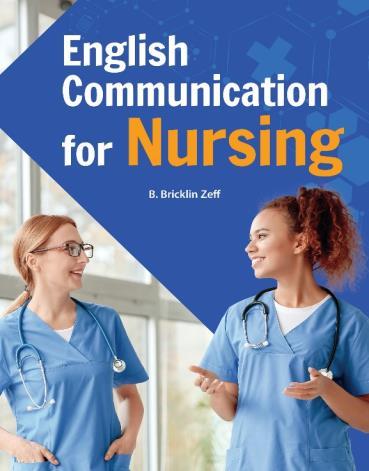
Each Unit
[Watching/Listening]
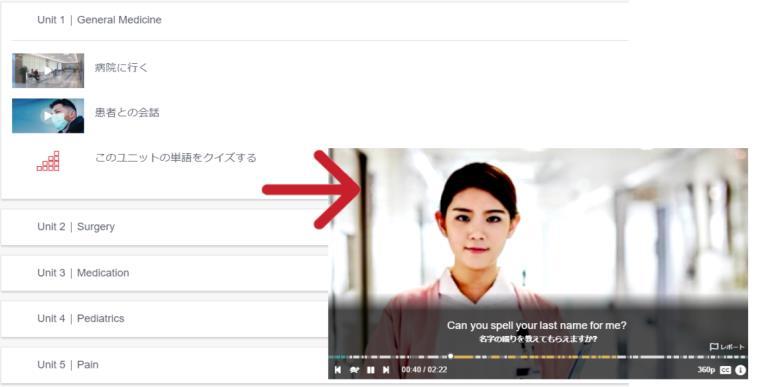
Video 1 & 2
The first two videos are Video 1 & 2 from the textbook, and other related topic videos are also available for a total of 39 videos.
The videos reflect actual communication between patients and nurses in a hospital setting. The videos are designed to improve communication skills by incorporating elements of politeness and understanding of the other person into the dialogue and expressions. The videos can be subtitled in English or Japanese.
Click on an unfamiliar word to hear its pronunciation, diacritical marks, part of speech, meaning in Japanese, and examples of usage.
Playback can be slowed down.
Stop function for each line of dialogue.
[Learning Vocabulary]
[Speak & Read aloud]
Vocabulary learning features such as vocabulary acquisition from video context, word lists, etc. Type or dictate to answer multiple choice questions.
Designed to take full advantage of EnglishCentral's unique learning features, including IntelliSpeech speech recognition technology.
Provides immediate feedback when sentences are spoken.
[AI Chat / Talk about this video]. AI Chat: Type or dictate answers to video-based topics (you can replay your answers).
Learning Status Check your learning progress and points earned.
各ユニット
[見る・リスニング]
[学ぶ・単語を学習]
Video 1 & 2
冒頭2つはテキストのVideo 1 & 2の動画、その他は「あいさつ」「名前とアルファベット」などの English Communication for Nursingテキスト以外の素材で関連トピック動画が視聴可能、合計39 レッスンが用意されています。
病院内での対患者および看護師同士の実際のコミュニケーションを反映した動画で構成。
礼儀正しさ、相手に対する理解の要素を対話や表現に組み込みコミュニケーションスキル向上を図 る。
動画に英語・日本語訳の字幕表示選択可。
知らない単語をクリックすると音声で発音、発音記号、品詞、日本語の意味、使用例を表示。
速度を落とした再生可。
セリフごとに停止選択可。
動画文脈からの語彙習得、単語リストなどの単語学習機能。
タイプして書き取り、または四択で意味を回答。 [話す・セリフを音読] IntelliSpeechの音声認識技術を含むEnglishCentral独自の学習機能をフルに活用して設計。
[AIチャット・この動画について語る]
文章を発話すると即時のフィードバックを提供。
AIチャット:動画に即したトピックについてタイプまたは発話で回答(自分の回答再生可)。 学習状況 今週・これまでの学習進捗状況、獲得ポイント確認可。